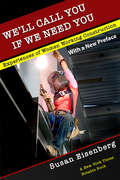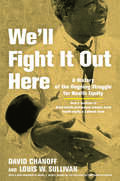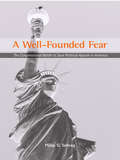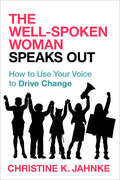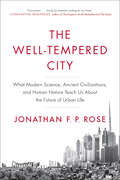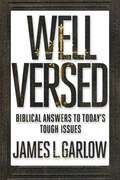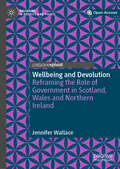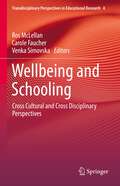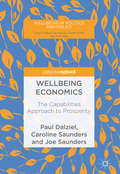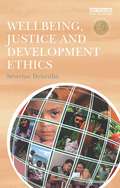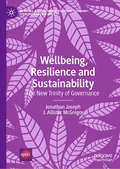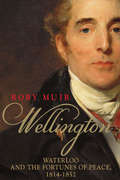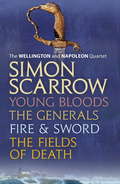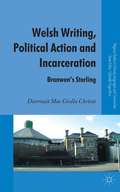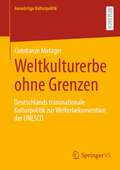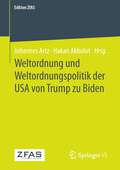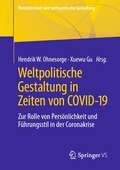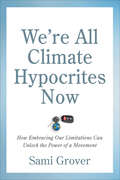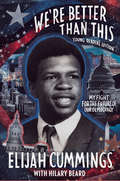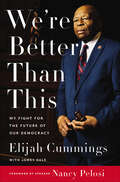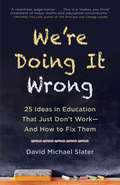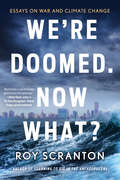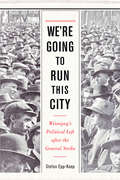- Table View
- List View
We'll Call You If We Need You: Experiences of Women Working Construction
by Susan EisenbergSusan Eisenberg began her apprenticeship with Local 103 of the International Brotherhood of Electrical Workers in 1978, the year president Jimmy Carter set goals and timetables for the hiring of women on federally assisted construction projects and for the inclusion of women in apprenticeship programs. Eisenberg expected not only a challenging job and the camaraderie of a labor union but also the chance to be part of a historic transformation, social and economic, that would make the construction trades accessible to women.That transformation did not happen. In this book, full of the raw drama and humor found on a construction site, Eisenberg gracefully weaves the voices of thirty women who worked as carpenters, electricians, ironworkers, painters, and plumbers to examine why their numbers remained small. Speaking as if to a friend, women recall their decisions to enter the trades, their first days on the job, and their strategies to gain training and acceptance. They assess with thought, passion, and twenty years' perspective the affirmative action efforts. Eisenberg introduces this new edition with a preface that shows how things have changed and how they have stayed the same since the book’s original publication. She ends with a discussion of the practices and policies that would be required to uproot gender barriers where they are deeply embedded in the organization and culture of the workplace.
We'll Fight It Out Here: A History of the Ongoing Struggle for Health Equity
by David Chanoff Louis W. SullivanHow a coalition of Black health professions schools made health equity a national issue.Racism in the US health care system has been deliberately undermining Black health care professionals and exacerbating health disparities among Black Americans for centuries. These health disparities only became a mainstream issue on the agenda of US health leaders and policy makers because a group of health professions schools at Historically Black Colleges and Universities banded together to fight for health equity. We'll Fight It Out Here tells the story of how the Association of Minority Health Professions Schools (AMHPS) was founded by this coalition and the hard-won influence it built in American politics and health care. David Chanoff and Louis W. Sullivan, former secretary of health & human services, detail how the struggle for equity has been fought in the field of health care, where bias and disparities continue to be volatile national issues. Chanoff and Sullivan outline the history of Black health care, from pre-Emancipation to today, centering on the work of AMHPS, which brought to light health care inequities in 1983 and precipitated virtually all minority health care legislation since then. Based on extensive research in the literature, as well as more than seventy interviews with the people central to this fight for legislative and policy change, We'll Fight It Out Here is the important story of a vital coalition movement, virtually unknown until now, that changed the national understanding of health inequities.The work of this coalition of Black health schools continues, both in supporting the training of more doctors and health professionals from minority backgrounds and in advancing issues related to health equity. By highlighting these endeavors, We'll Fight It Out Here brings attention to a pivotal group in the history of the health equity movement and provides a road map of practical mechanisms that can be used to advance it.
A Well-Founded Fear: The Congressional Battle to Save Political Asylum in America
by Philip G. SchragFirst published in 2000. Routledge is an imprint of Taylor & Francis, an informa company.
The Well-Spoken Woman Speaks Out: How to Use Your Voice to Drive Change
by Christine K. JahnkePractical and inspiring, this book is a valuable asset for women seeking to drive change with #MeToo, March for our Lives, Time's Up, Black Women Lead, Climate Action, She Should Run, Power to the Polls, and women's marches.In her successful book The Well-Spoken Woman, top speech coach Christine K. Jahnke shared techniques to help women present their ideas effectively in any setting. This new follow-up is for women who are persisting, resisting, advocating, or running for office--and gives them the tools to be effective, persuasive, and powerful communicators. The Well-Spoken Woman Speaks Out will guide any woman who wants to state her case in the most compelling way, ensure that she is truly heard and understood, and seeks to impact and inspire others. It takes Jahnke's direct experience working with women like Michelle Obama and the presidential campaign of Hillary Clinton and pairs it with the recent surge of women nationwide who are speaking up to drive social and political change. Jahnke, who has spent twenty-five years helping women leaders, provides guidance and best practices so you can: rally support for a cause, make a persuasive pitch, campaign for public office, be a successful advocate, and motivate people to make positive change. She applies her expertise to many facets of communicating publicly, including using your voice in social media; participating in panels, meetings, and discussions; giving presentations; and speaking to the media.
The Well-Tempered City: What Modern Science, Ancient Civilizations, and Human Nature Teach Us About the Future of Urban Life
by Jonathan F. Rose2017 PROSE Award Winner: Outstanding Scholarly Work by a Trade PublisherIn the vein of Jane Jacobs’s The Death and Life of Great American Cities and Edward Glaeser’s Triumph of the City, Jonathan F. P. Rose—a visionary in urban development and renewal—champions the role of cities in addressing the environmental, economic, and social challenges of the twenty-first century.Cities are birthplaces of civilization; centers of culture, trade, and progress; cauldrons of opportunity—and the home of eighty percent of the world’s population by 2050. As the 21st century progresses, metropolitan areas will bear the brunt of global megatrends such as climate change, natural resource depletion, population growth, income inequality, mass migrations, education and health disparities, among many others. In The Well-Tempered City, Jonathan F. P. Rose—the man who “repairs the fabric of cities”—distills a lifetime of interdisciplinary research and firsthand experience into a five-pronged model for how to design and reshape our cities with the goal of equalizing their landscape of opportunity. Drawing from the musical concept of “temperament” as a way to achieve harmony, Rose argues that well-tempered cities can be infused with systems that bend the arc of their development toward equality, resilience, adaptability, well-being, and the ever-unfolding harmony between civilization and nature. These goals may never be fully achieved, but our cities will be richer and happier if we aspire to them, and if we infuse our every plan and constructive step with this intention.A celebration of the city and an impassioned argument for its role in addressing the important issues in these volatile times, The Well-Tempered City is a reasoned, hopeful blueprint for a thriving metropolis—and the future.
Well Versed: Biblical Answers to Today's Tough Issues
by James L. GarlowWhat should a Christian say when confronted with today's burning political questions? How can a person of faith use the Bible as a resource when navigating controversial cultures issues? <P><P>Skyline Church Pastor James L. Garlow presents God Is My Debate Coach, the ultimate scripture-based guide for Christians looking for answers, reassurance, and resources on the issues of today. (Topics include: Israel, Social Justice, Sexual Identity, Debt, Taxes, Abortion, Bioethics, the Role of Government, War, Islam, Entertainment, and more.)
Wellbeing and Devolution: Reframing the Role of Government in Scotland, Wales and Northern Ireland (Wellbeing in Politics and Policy)
by Jennifer WallaceIt has been over twenty years since the people of Scotland, Wales and Northern Ireland voted for devolution. Over that time, the devolved legislatures have established themselves and matured their approach to governance. At different times and for different reasons, each has put wellbeing at the heart of their approach – codifying their values and goals within wellbeing frameworks. This open access book explores, for the first time, why each set their goal as improving wellbeing and how they balance the core elements of societal wellbeing (economic, social and environmental outcomes). Do the frameworks represent a genuine attempt to think differently about how devolved government can plan and organise public services? And if so, what early indications are there of the impact is this having on people’s lives?
Wellbeing and Schooling: Cross Cultural and Cross Disciplinary Perspectives (Transdisciplinary Perspectives in Educational Research #4)
by Ros McLellan Carole Faucher Venka SimovskaCollectively, the research presented in this book revisits, challenges, and rearticulates taken-for-granted wellbeing conceptualisations, policies and intervention frameworks, as critical discussion of wellbeing in relation to children and young people from a variety of socio-cultural, political, and economic settings is still relatively sparse. The contributions work synergistically to generate a sophisticated understanding of children’s wellbeing while introducing fresh and context-sensitive approaches. Pre-conceived and taken-for-granted notions of wellbeing are problematised through four sections in (i) Re-examining conceptualisations of wellbeing in educational research and policy; (ii) Focusing on School environments, schooling, and wellbeing; (iii) Examining the significance of cultural contexts; and (iv) Amplifying children's voices. The objective is to help generate new ways of researching and thinking about wellbeing and schooling, that transcend monocultural, monodisciplinary and monomethodological strategies. The book aims to stimulate further theoretical and empirical research, as well as development of effective policies and school interventions which nuance rather than reduce complexity of both education and wellbeing.
Wellbeing Economics: The Capabilities Approach to Prosperity (Wellbeing in Politics and Policy)
by Paul Dalziel Caroline Saunders Joe SaundersEconomists have long sought to maximise economic growth, believing this to be their best contribution to improving human welfare. That approach is not sustainable in the face of ongoing issues such as global climate change, environmental damage, rising inequality and enduring poverty. Alternatives must be found.This open access book addresses that challenge. It sets out a wellbeing economics framework that directly addresses fundamental issues affecting wellbeing outcomes. Drawing inspiration from the capabilities approach of Nobel Prize winner Amartya Sen, the book demonstrates how persons can enhance prosperity through their own actions and through collaboration with others.The book examines national public policy, but its analysis also focuses on choices made by individuals, households, families, civil society, local government and the global community. It therefore offers important insights for anyone concerned with improving personal wellbeing and community prosperity.
Wellbeing, Justice and Development Ethics
by Severine DeneulinThe question of the meaning of progress and development is back on the political agenda. How to frame this discontent and search for new alternatives when either Marxism or liberalism no longer provides a satisfactory framework? This book introduces in an accessible way the capability approach, first articulated by Amartya Sen in the early 1980s. Written for an international audience, but rooted in the Latin American reality - a region with a history of movements for social justice - the book argues that the capability approach provides to date, the most encompassing and compelling ethical framework with which to construct action for improving people’s wellbeing and reducing injustices in the world. This book outlines in a clear and concrete way what the capability approach is and its significance for the social sciences and policy. It describes the distinctiveness of the approach as an ethical framework for action and aims to stimulate critical reflection on current economic and social practices as well as providing a language with which to modify them within human wellbeing concerns. Comprehensive, practical and nuanced in its treatment of the capability approach, this highly original volume gives students, researchers and professionals in the field of development an innovative framing of the capability approach as a 'language' for action and provides specific examples of how it has made a difference.
Wellbeing, Resilience and Sustainability: The New Trinity of Governance (Building a Sustainable Political Economy: SPERI Research & Policy)
by Jonathan Joseph J. Allister McGregorWellbeing, resilience and sustainability are three of the most popular ideas in current usage and are said to represent a much-needed paradigm shift in political and policy thinking. This book is unique in bringing the three concepts together as representing a new trinity of governance. Here we introduce some of the commonalities between the ideas, particularly their concern with distinctive human capacities that shape who we are and that imply a particular relationship to our wider social and natural environments. The book explains what is distinctive about the three ideas and why they are currently popular. In particular, we are concerned with how these ideas contribute to governance ‘after the crisis’, and how questions of social, political and economic uncertainty influence the ways in which these main arguments are developed. The book will appeal to those studying these ideas, how they apply to politics, political economy and governance, and to the wider public and policy-makers in these fields.
Wellington: The Story Of A Scottish Soldier And Statesman, Wellington's Quartermaster General (From Reason To Revolution Ser. #114)
by Rory MuirThe preeminent Wellington biographer presents a fascinating reassessment of the Duke&’s most famous victory and his political career after Waterloo. The Duke of Wellington&’s momentous victory over Napoleon at the Battle of Waterloo was the culminating point of a brilliant military career. Yet Wellington&’s achievements were far from over. He commanded the allied army of occupation in France to the end of 1818, returned home to a seat in Lord Liverpool&’s cabinet, and became prime minister in 1828. He later served as a senior minister in Robert Peel&’s government and remained Commander-in-Chief of the Army for a decade until his death in 1852. In this richly detailed work, the second and concluding volume of Rory Muir&’s definitive biography, the author offers a substantial reassessment of Wellington&’s significance as a politician and a nuanced view of the private man behind the legendary hero. Muir presents new insights into Wellington&’s determination to keep peace at home and abroad, achieved by maintaining good relations with the Continental powers, resisting radical agitation, and granting political equality to the Catholics in Ireland. Countering one-dimensional image of Wellington as a national hero, Muir paints a nuanced portrait of a man whose austere public demeanor belied his entertaining, gossipy, generous, and unpretentious private self.
The Wellington and Napoleon Quartet: Young Bloods, The Generals, Fire and Sword, Fields of Death
by Simon ScarrowSimon Scarrow's four classic novels based on the lives of the Duke of Wellington and Napoleon Bonaparte are published together in one superb-value ebook volume not to be missed by readers of Bernard Cornwell. Arthur, Duke of Wellington, and Emperor Napoleon Bonaparte were adversaries on an epic scale. Across Europe and beyond, the armies of Great Britain and France clashed, from the Iberian Peninsula to India, from Austerlitz to the final confrontation at Waterloo. What drove the two clever, ambitious, determined men who masterminded these military campaigns? How did the underdog from Corsica develop the strategic military skills and the political cunning that gave him power over swathes of Europe? And how did Wellington, born to be a leader, hone his talents and drive an army to victory after victory?From an outstanding historian and novelist come four epic novels, now available in one volume for the first time, which tell the full story of both these men, from their very early days till the momentous battle at Waterloo which decided the future of Europe.INCLUDES MAPS
The Wellington and Napoleon Quartet: Young Bloods, The Generals, Fire and Sword, Fields of Death
by Simon ScarrowSimon Scarrow's four classic novels based on the lives of the Duke of Wellington and Napoleon Bonaparte are published together in one superb-value ebook volume not to be missed by readers of Bernard Cornwell. Arthur, Duke of Wellington, and Emperor Napoleon Bonaparte were adversaries on an epic scale. Across Europe and beyond, the armies of Great Britain and France clashed, from the Iberian Peninsula to India, from Austerlitz to the final confrontation at Waterloo. What drove the two clever, ambitious, determined men who masterminded these military campaigns? How did the underdog from Corsica develop the strategic military skills and the political cunning that gave him power over swathes of Europe? And how did Wellington, born to be a leader, hone his talents and drive an army to victory after victory?From an outstanding historian and novelist come four epic novels, now available in one volume for the first time, which tell the full story of both these men, from their very early days till the momentous battle at Waterloo which decided the future of Europe.INCLUDES MAPS
Wellness Architecture and Urban Design
by Phillip James Tabb Lahra TatrieleWellness is a contemporary concept with deep ancient roots promoting preventative and holistic activities, lifestyle choices, and salient architecture and urban design practices. Wellness Architecture and Urban Design presents definitions, an analysis of the wellness literature, and a brief history of the wellness movement. Specific planning and design strategies are presented citing examples worldwide and emphasizing the importance of wellness considerations at all scales of the built environment from rooms to cities. Both case studies offer fully integrated and comprehensive wellness design approaches creating resilient and life-enhancing wellness through each of the architecture and urban design scales. The book will be of interest to practitioners and students working in urban design, landscape architecture, architecture, planning, and affiliated fields.
Welsh Writing, Political Action and Incarceration: Branwen’s Starling (Palgrave Studies in Minority Languages and Communities)
by Diarmait Mac Giolla ChríostWelsh Writing, Political Action and Incarceration examines the prison literature of certain iconic Welsh authors whose political lives and creative writings are linked to ideas about Wales and the Welsh language, the nature of political activism, and the function of incarceration.
Weltkulturerbe ohne Grenzen: Deutschlands transnationale Kulturpolitik zur Welterbekonvention der UNESCO (Auswärtige Kulturpolitik)
by Constanze MetzgerForderungen an eine deutsche Auswärtige Kulturpolitik, die sich nicht mehr an nationalstaatlichen Interessen, sondern an geteilter Verantwortung orientiert, sind allgegenwärtig. In diesem Kontext leistet die hier vorgestellte Untersuchung einen wissenschaftlichen Beitrag zur Auswärtigen Kulturpolitik in der Welterbekonvention. Constanze Metzger analysiert die außenkulturpolitische Entwicklung Deutschlands in der UNESCO bis 1972 – dem Jahr, in dem die Welterbekonvention verabschiedet wurde. Sie evaluiert Wechselwirkungen zwischen nationalstaatlichen Interessen und transnationalen Zielen in der Konvention und verdeutlicht Interdependenzen von Politik und Kultur, die sowohl Konfliktpotentiale als auch Kooperationsmöglichkeiten zum Kulturerbeschutz bieten. Auf diesen Erkenntnissen aufbauend wird die praktische Umsetzung transnationaler und grenzüberschreitender Welterbestätten am Beispiel des deutsch-polnischen Muskauer Parks untersucht. Die Autorin beantwortet die Frage, ob hier das Nationale aufgelöst und dadurch Weltkulturerbe ohne Grenzen geschützt wird. Daraus resultierend schlägt die Autorin Desiderata einer transnationalen Auswärtigen Kulturpolitik vor.
Weltordnung und Weltordnungspolitik der USA von Trump zu Biden (Edition ZfAS)
by Johannes Artz Hakan Akbulut„America is back“, kündigte Joe Biden in seiner ersten Grundsatzrede zur US-amerikanischen Außenpolitik kurz nach seinem Einzug in das Weiße Haus an und bekannte sich zur Führungsrolle der USA auf der Weltbühne. Gerade diese Führungsrolle war von seinem Amtsvorgänger Donald J. Trump zurückgewiesen worden, der zudem einen antiliberalen Kurs im Inneren wie Äußeren verfolgt und somit die Krise der internationalen Ordnung verschärft hatte. Etwa zwei Jahre nach der Amtsübernahme Bidens nimmt diese Ausgabe der Edition ZfAS die Weltordnungspolitik seiner Administration unter die Lupe und untersucht, ob und wie sich die Weltordnungspolitik der USA von Trump zu Biden verändert hat, was den Revisionismus von Russland und China begründet und wie es um die internationale Ordnung und ihre Zukunft bestellt ist. Die Analysen fokussieren dabei sowohl auf die systemische als auch die subsystemische Ebene, tragen politischen, wirtschaftlichen wie normativen Einflussfaktoren Rechnung und haben globale wie regionale Herausforderungen zum Gegenstand.
Weltpolitische Gestaltung in Zeiten von COVID-19: Zur Rolle von Persönlichkeit und Führungsstil in der Coronakrise (Persönlichkeit und weltpolitische Gestaltung)
by Xuewu Gu Hendrik W. OhnesorgeDer Sammelband untersucht den Umgang ausgewählter Nationalstaaten mit der globalen COVID-19-Pandemie unter Anwendung des personenbezogenen Ansatzes der Politikwissenschaft. Der Band geht dabei von der grundlegenden These aus, dass sich der Umgang mit der Krise in entscheidendem Maße auf die Persönlichkeit und den Führungsstil der jeweils an der Spitze stehenden politischen Entscheidungsträgerinnen und Entscheidungsträger zurückführen lässt. Zu diesem Zweck nehmen die einzelnen Beiträge des Bandes ausgewählte Persönlichkeiten der Weltpolitik in den Blick, um deren Entscheidungen und Handlungen in der Coronakrrise zu untersuchen.
We're All Climate Hypocrites Now: How Embracing Our Limitations Can Unlock the Power of a Movement
by Sami GroverA useful — and sprightly! — effort to get at the choice between individual and systemic action on the greatest problem we've ever faced. — Bill McKibben, author, The End of NatureTaking a tongue-in-cheek approach, self-confessed eco-hypocrite Sami Grover says we should do what we can in our own lives to minimize our climate impacts and we need to target those actions so they create systemic change. We're All Climate Hypocrites Now helps you decide what are the most important climate actions to take for your own personal situation.Our culture tells us that personal responsibility is central to tackling the climate emergency, yet the choices we make are often governed by the systems in which we live. Whether it's activists facing criticism for eating meat or climate scientists catching flack for flying, accusations of hypocrisy are rampant. And they come from both inside and outside the movement.Sami Grover skewers those pointing fingers, celebrates those who are trying, and offers practical pathways to start making a difference. We're All Climate Hypocrites Now covers:How environmentalism lost its grooveWhy big polluters want to talk about your carbon footprintThe psychology of shamingHow businesses can find their activist voiceThe true power of individuals to spark widespread change.By understanding where our greatest leverage lies, we can prioritize our actions, maximize our impact, and join forces with the millions of other imperfect individuals who are ready to do their part and actually change the system.
We're Better Than This: My Fight for the Future of Our Democracy
by Elijah CummingsPart memoir, part call to action, this young readers’ edition dives into the inspiring life of the late U.S. Representative Elijah Cummings—from childhood through his time as chairman of the House Oversight Committee—and his tireless fight for justice. Elijah’s story comes complete with a full-color insert of photographs from the congressman’s life. Growing up as the child of former sharecroppers in a segregated Baltimore, Elijah Cummings saw firsthand how injustice could run rampant, even in a democracy that promises fairness and equality. But with a strong support system and fiery self-discipline, Elijah utilized the momentum of the civil rights movement to overcome the obstacles of poverty and racism to effect change at a time when our country so badly needed it.In We’re Better Than This, readers will learn not only that we must be and do better than our oppressors but that it is our shared responsibility as a nation to keep our democracy intact because it is the only way to pursue freedom, justice, and equality for all.
We're Better Than This: My Fight for the Future of Our Democracy
by Elijah Cummings James DaleOne of Essence's Best Books of the YearNAACP Image Awards Winner for Outstanding Literary WorkWith a foreword by Speaker Nancy Pelosi“There was no greater friend to the poor, to the lost, to the left out, and to the left behind. If you want to understand this great man, read his historic, important book and learn the lessons and values from his ‘moral voice crying in the wilderness’ on behalf of our American democracy.” —Rep. John Lewis (D-GA)Known for his poise, intellect, and influence until his death in October 2019, Elijah Cummings was one of the most respected figures in contemporary politics, a politician who held fast to his beliefs but was not afraid to reach across the aisle in the name of friendship and progress. Since his earliest days in government through his time as a representative and chairman of the House Oversight and Reform Committee, he proved his abilities as a politician who could operate at the highest levels of democracy, serving the people of Baltimore and illustrating the importance of working with—and for—the underdog.Yet in his final years of life, Cummings recognized that democracy was the underdog. We’re Better Than This draws from Cummings’s own life to show the formative moments that prepared him for the disturbing first years of the Trump presidency and spurred him to hold the administration accountable for their actions. Weaving together the urgent drama of modern-day politics and character-defining stories from his past, Cummings offers a never-before-told perspective on how his personal history, coming of age in South Baltimore, laid the foundation of a life spent fighting for justice. He goes behind the scenes with the House Democratic leadership, offering an eye-opening chronicle of the grim realities of holding the Trump administration to account. Detailing this moment of unprecedented obstructionism by both the president and Republicans, Cummings presents a vital defense of how government oversight defines our collective trust, examining the dangerous precedent for both parties that exists if the executive branch remains above public scrutiny.Part memoir, part call to action, We’re Better Than This is the story of our modern-day democracy and the threats that we all must face together, as well as a retrospective on the life and career of one of our country’s most inspirational politicians. As we approach another test of our democracy, the next race for the White House, We’re Better Than This reminds people that in this country we don’t elect kings, and we cannot afford four more years of this false one.
We're Doing It Wrong: 25 Ideas in Education That Just Don't Work—And How to Fix Them
by David Michael SlaterAn unapologetic critique of major flaws in the American education system. David Michael Slater’s We’re Doing It Wrong is a thought-provoking dissection of the issues plaguing American public schools. Each chapter identifies a major problem in the education system, exploring its roots and repercussions. A teacher himself, Slater opens up and gives readers an insider’s perspective on topics that have been at the center of ongoing debates as well as recent hot button issues, such as: • Standardized testing • Teacher evaluation practices • Helicopter parents • Class size • Poverty’s effect on performance • Anti-bullying programs • Writing proficiency • Curriculum goals Slater explains why our current approaches simply aren’t working—for students, for teachers, for the colleges that these students may eventually attend, and for society at-large. Unafraid to ruffle a few feathers, We’re Doing It Wrong highlights defects in policy and theory, calls out administration, and questions long-held beliefs. Every chapter concludes with a suggestion for improvement, offering light at the end of the tunnel. Administrators, teachers, and concerned parents will come away with a better understanding of the current state of education and ideas for moving toward progress—for themselves and for the students they support.
We're Doomed. Now What?: Essays on War and Climate Change
by Roy ScrantonAn American Orwell for the age of Trump, Roy Scranton faces the unpleasant facts of our day with fierce insight and honesty. We’re Doomed. Now What? penetrates to the very heart of our time.Our moment is one of alarming and bewildering change—the breakup of the post-1945 global order, a multispecies mass extinction, and the beginning of the end of civilization as we know it. Not one of us is innocent, not one of us is safe. Now what?We’re Doomed. Now What? addresses the crisis that is our time through a series of brilliant, moving, and original essays on climate change, war, literature, and loss, from one of the most provocative and iconoclastic minds of his generation. Whether writing about sailing through the melting Arctic, preparing for Houston’s next big storm, watching Star Wars, or going back to the streets of Baghdad he once patrolled as a soldier, Roy Scranton handles his subjects with the same electric, philosophical, demotic touch that he brought to his groundbreaking New York Times essay, “Learning How to Die in the Anthropocene.”
We’re Going to Run This City: Winnipeg's Political Left after the General Strike
by Stefan Epp-KoopStefan Epp-Koop’s "We’re Going to Run This City: Winnipeg’s Political Left After the General Strike" explores the dynamic political movement that came out of the largest labour protest in Canadian history and the ramifications for Winnipeg throughout the 1920s and 1930s. Few have studied the political Left at the municipal level—even though it is at this grassroots level that many people participate in political activity. Winnipeg was a deeply divided city. On one side, the conservative political descendants of the General Strike’s Citizen’s Committee of 1000 advocated for minimal government and low taxes. On the other side were the Independent Labour Party and the Communist Party of Canada, two parties rooted in the city’s working class, though often in conflict with each other. The political strength of the Left would ebb and flow throughout the 1920s and 1930s but peaked in the mid-1930s when the ILP’s John Queen became mayor and the two parties on the Left combined to hold a majority of council seats. Astonishingly, Winnipeg was governed by a mayor who had served jail time for his role in the General Strike.
